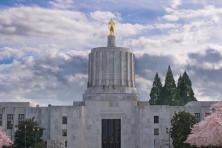Today, members of the business community, social and environmental justice organizations, Tribes, labor, and experts in climate policy and solutions spoke to the urgent need to uphold Oregon’s landmark Climate Protection Program (CPP) as the state initiates a process to restore the rules. The group is part of the Oregon’s Department of Environmental Quality’s (DEQ) Rulemaking Advisory Committee supporting DEQ as the agency works toward reinstatement of the CPP, which will create thousands of jobs, cleaner air, and healthier communities.
“Today we’re back at the table bringing voices from every Oregon community calling for the climate action needed to ensure a safe, equitable future,” said Ira Cuello Martinez, Policy and Advocacy Director of PCUN. “We’re heartened by Governor Kotek’s support for DEQ to begin this process once more, and look forward to seeing the benefits the CPP will bring to families and communities across the state.”
First adopted by the Environmental Quality Commission in 2021, the CPP outlines a clear, achievable plan to help Oregon reach its climate goals by requiring the state’s largest polluters to cut their carbon emissions. As a result of gas and oil industry lawsuits, the Oregon Court of Appeals invalidated the CPP in December 2023 due to a technicality. In March 2024 DEQ launched a rulemaking process to reinstate the program by the end of this year, the first step of which began with today’s advisory committee meeting.
In her initial remarks at the rulemaking meeting today, Leah Feldon, Director of DEQ, emphasized that the agency is not starting from scratch in the process to reinstate the CPP before the end of 2024. Director Feldon made clear that this rulemaking process should result in a program that has the same scope and ambition of the initial CPP, while considering if there’s anything that should be updated.
The rulemaking advisory committee is made up of experts in climate policy and solutions, community organizations, public health and labor advocates, business leaders, and members of the fossil fuel industry and other regulated industries who will be providing input to the DEQ over the next several months.
Under the CPP, Oregon’s oil and gas companies must cut emissions by 50% by 2035 and 90% by 2050. These emitters can also contribute to the innovative Community Climate Investment program, which is estimated to deliver more than $150 million to help lower Oregonian’s energy bills and support clean energy projects that benefit Black, Indigenous, people of color, low-income, rural and other communities across the state.
“More than 7,600 Oregonians participated in the last rulemaking process, with an overwhelming majority calling for protections that prioritize the health and safety of our communities over the oil and gas industry profits,” said Nora Apter, Director of Programs for the Oregon Environmental Council. “We continue to demand the State hold the oil and gas industry accountable for the impact it is having on our lives, our families and our local economies.”
Prior to the Court’s decision to invalidate the rules, the Climate Protection Program was projected to achieve 45% of the state’s targeted emissions reductions by 2035, and invest hundreds of millions of dollars annually in environmental justice communities across Oregon. Oregonians were eagerly awaiting Climate Climate Investments in their communities in projects like rooftop solar, home energy efficiency retrofits, and electric vehicle infrastructure.
DEQ’s proposed rules will be informed by the advisory committee and public comments. They will be reviewed and voted on by Oregon’s Environmental Quality Commission later this year.
Key dates in the process are as follows noting opportunity for public comment:
- May 14: Second rulemaking advisory committee meeting
- June 25: Third, final rulemaking advisory committee meeting
- July: DEQ publishes Notice of Proposed Rulemaking
- Late Summer: Public comment period and public hearing
- Fall: DEQ reviews comments and makes any needed revisions
- November: EQC votes on proposed rules
- January: New program starts implementation
The above statement was issued on behalf of Climate Solutions, Oregon Environmental Council, Oregon Business for Climate, PCUN and a growing coalition of community organizations working toward a clean energy future for Oregon.



